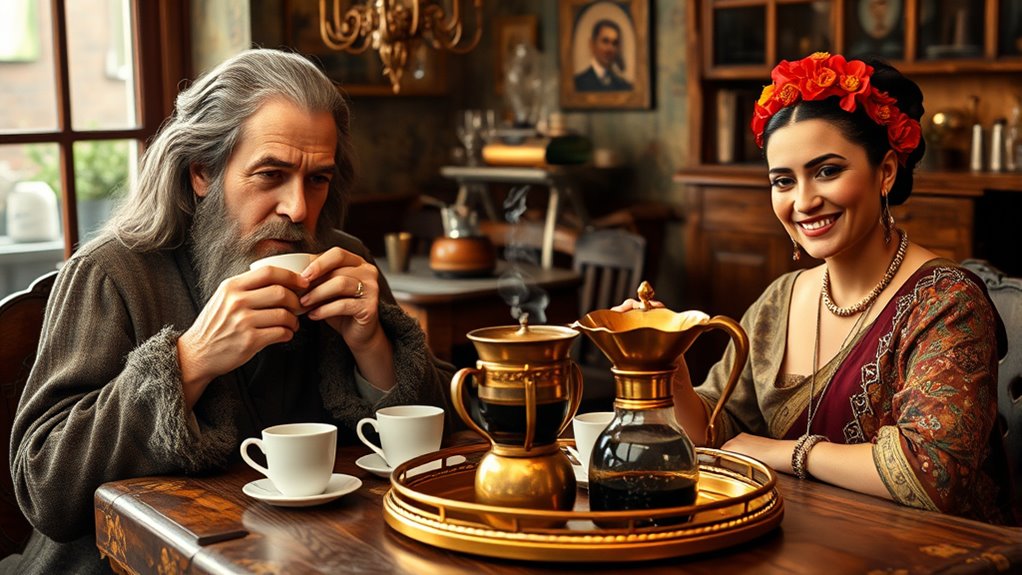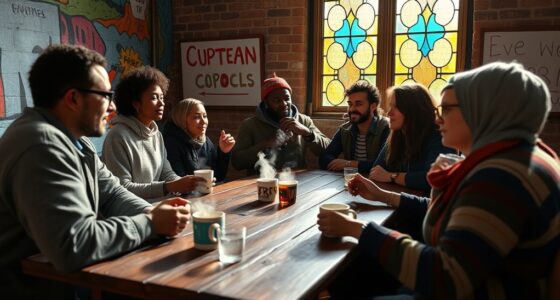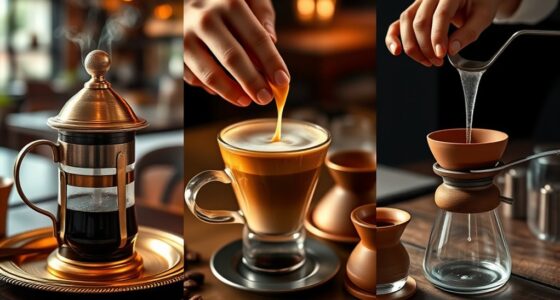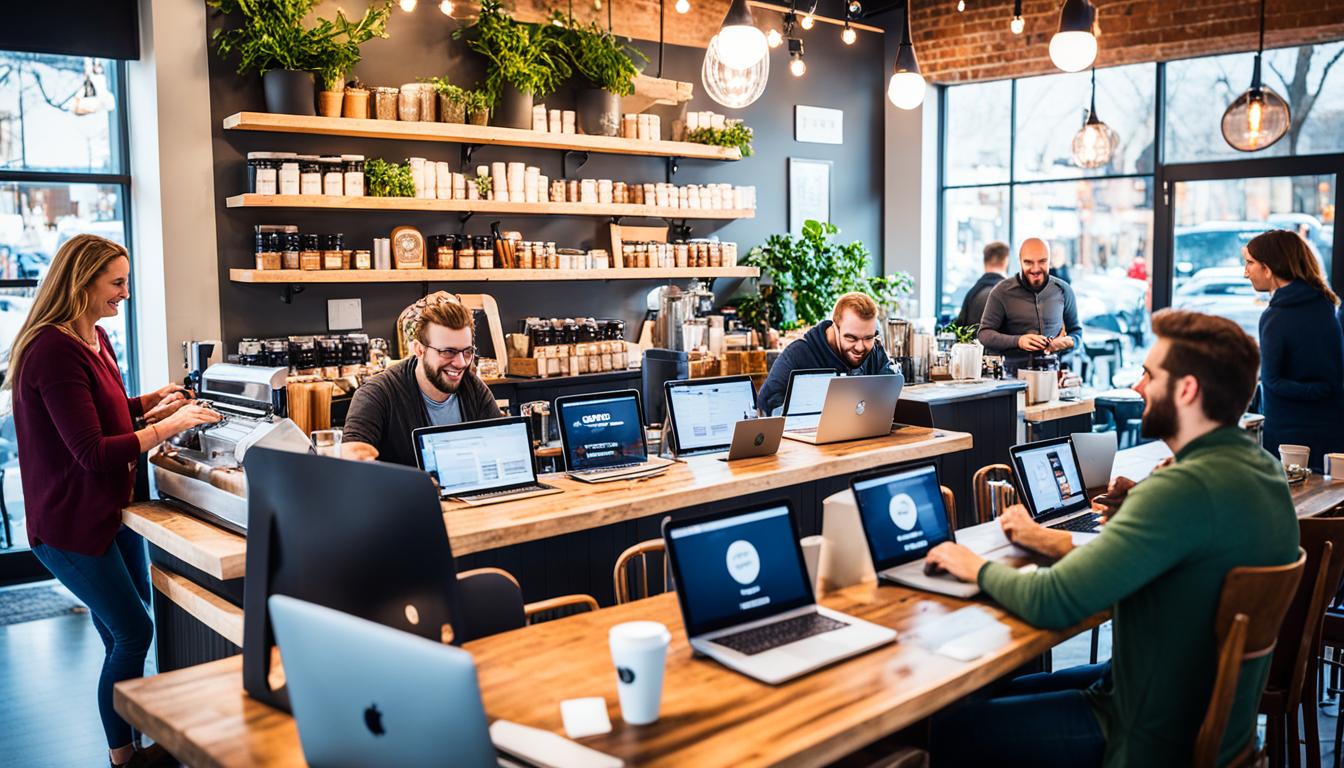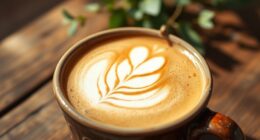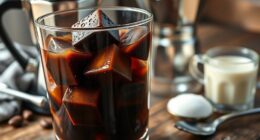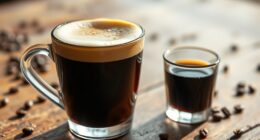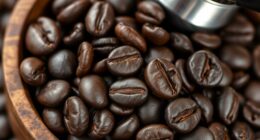Throughout history, many influential figures loved coffee for its ability to fuel their creativity and ideas. Voltaire drank up to 50 cups daily, believing it sparked his philosophy, while Benjamin Franklin frequented coffeehouses for political talks. Søren Kierkegaard added sugar cubes to make his brew uniquely sweet, and Honoré de Balzac relied on coffee to boost his prolific writing. If you’re curious, you’ll discover more about how these legendary personalities used coffee to shape their worlds.
Key Takeaways
- Voltaire drank up to 50 cups daily, fueling his philosophical ideas and influencing European culture.
- Benjamin Franklin frequented London coffeehouses for political discussions and sold his own coffee beans.
- Søren Kierkegaard added about 30 sugar cubes per cup, reflecting his personal and unique coffee routine.
- Honoré de Balzac consumed around 50 cups daily, using caffeine to boost productivity and creativity.
- Coffee historically supported the productivity and inspiration of influential thinkers and cultural figures.
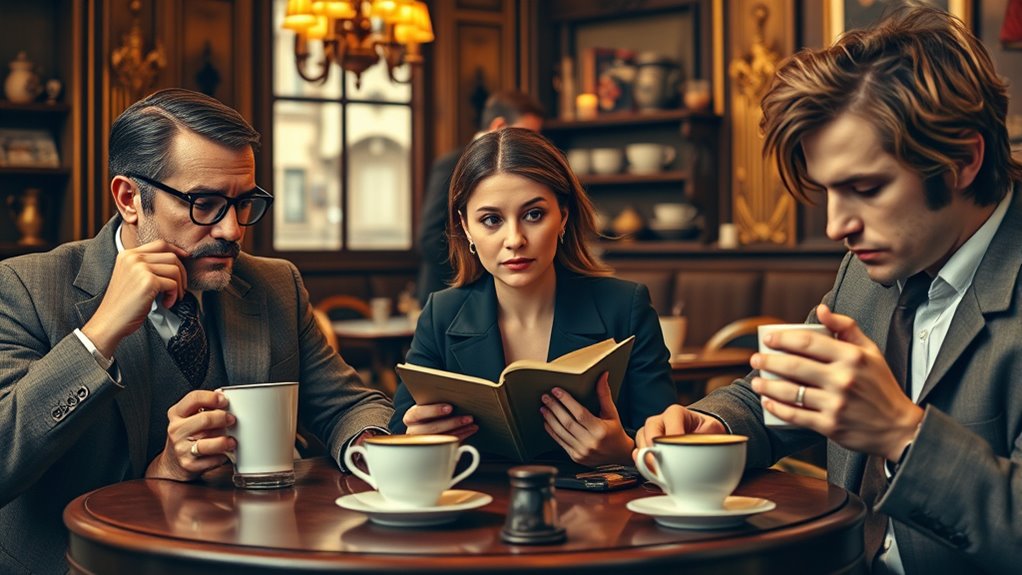
Voltaire, the famous French philosopher, reportedly drank up to 50 cups of coffee each day. Imagine that—your typical coffee habit pales in comparison. Voltaire believed that coffee fueled his philosophical ideas and enhanced his creativity. His intense coffee consumption exemplifies how some of the most influential thinkers relied heavily on caffeine to push their mental boundaries. Interestingly, the popularity of coffee during his time helped shape the cultural significance of coffee in European society.
If you’re interested in the minds behind great ideas, understanding their coffee habits offers insight into how coffee served as a mental stimulant, shaping history in subtle ways.
Benjamin Franklin also had a strong affinity for coffee. He often visited London coffeehouses for political discussions, where ideas flowed as freely as the coffee itself. Franklin even sold his own coffee beans, emphasizing how coffee consumption was intertwined with political discourse and social networking.
For you, it’s a reminder that coffee isn’t just a beverage but a social lubricant that historically fostered dialogue among influential individuals. Franklin’s frequent visits to coffeehouses underscore the importance of coffee in shaping conversations that influenced nations.
Søren Kierkegaard, the Danish philosopher, took a different approach to his coffee habits. He added about 30 sugar cubes per cup, creating a very sweet brew that became part of his daily ritual. His choice to sweeten his coffee so heavily reflects his unique personality and routines.
For you, this might be a sign that coffee habits are deeply personal, often tailored to individual tastes and rituals—whether it’s sugar cubes, cream, or black.
Honoré de Balzac, the prolific French novelist, reportedly consumed approximately 50 cups of coffee each day. He believed that it contributed to his prolific writing and ideas, fueling his creative process.
For writers and artists, Balzac’s coffee consumption demonstrates how caffeine can become an essential tool for productivity and inspiration. If you’re passionate about your craft, you can see how some of history’s great creators relied on coffee not just for taste but for their very livelihood.
Their stories highlight coffee’s enduring role in fostering creativity, intellectual pursuits, and cultural development.
Frequently Asked Questions
What Famous Person Loves Coffee?
You’re curious about who loves coffee, right? Well, many famous people have had a strong affection for it. Voltaire, for example, drank up to 50 cups daily, believing it sparked his ideas.
Beethoven needed exactly 60 coffee beans per cup, tying coffee to his creativity.
Benjamin Franklin often visited coffee houses for discussions.
Who Was the Biggest Coffee Addict?
When considering who was the biggest coffee addict, Theodore Roosevelt stands out. You might imagine him drinking over a gallon daily, almost like a bathtub of coffee.
His intense consumption surpasses many others, showing an obsession that shaped his energetic and vigorous persona.
Which Philosopher Was Obsessed With Coffee?
You want to know which philosopher was obsessed with coffee. Søren Kierkegaard stands out for his intense coffee habits, drinking around 50 cups daily.
He added about 30 sugar cubes per cup and gulped down strong black coffee in one go. His ritual shows how essential coffee was to his thinking process, fueling countless late-night reflections and emphasizing his meticulous approach to philosophy and life.
What Is a Lover of Coffee Called?
You want to know what a lover of coffee is called. Generally, they’re known as a “coffee lover,” “coffee enthusiast,” or “coffee aficionado.” These terms show their passion and appreciation for the beverage.
You might also hear people refer to themselves as “coffee fans” or “coffee connoisseurs,” depending on how deep their knowledge and love for coffee run. No matter the word, it’s clear you’re passionate about your coffee!
Conclusion
As you can see, many iconic figures throughout history have loved coffee, fueling their creativity and productivity. From writers to scientists, coffee’s energizing effects have inspired great achievements. So, next time you sip your favorite brew, remember you’re part of a long tradition shared by some of the most influential people in history. Enjoy your coffee—who knows, maybe it’ll spark your next big idea too!
